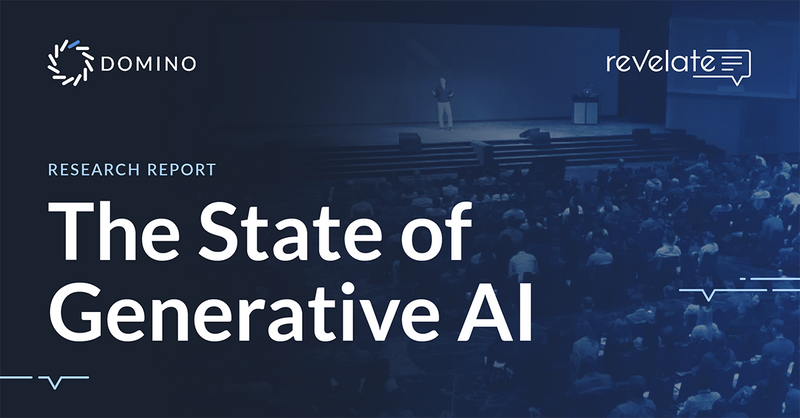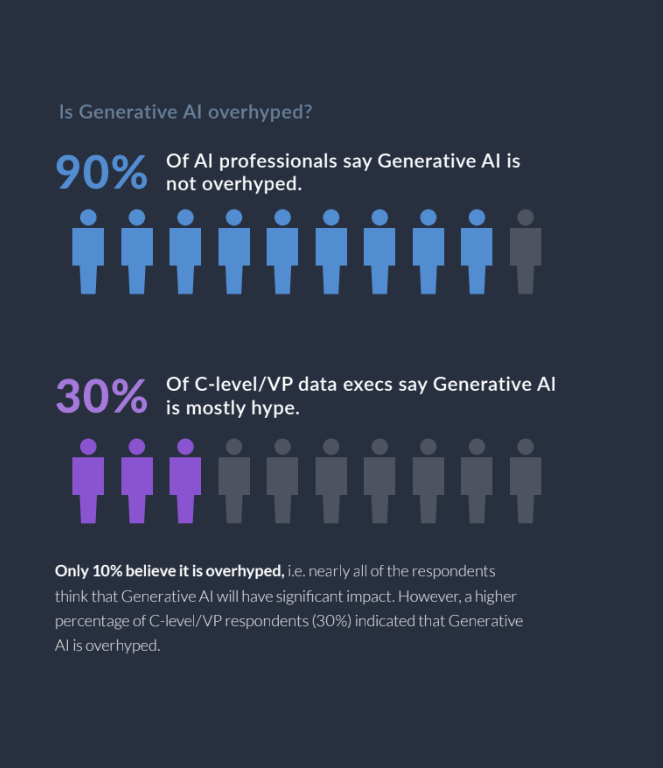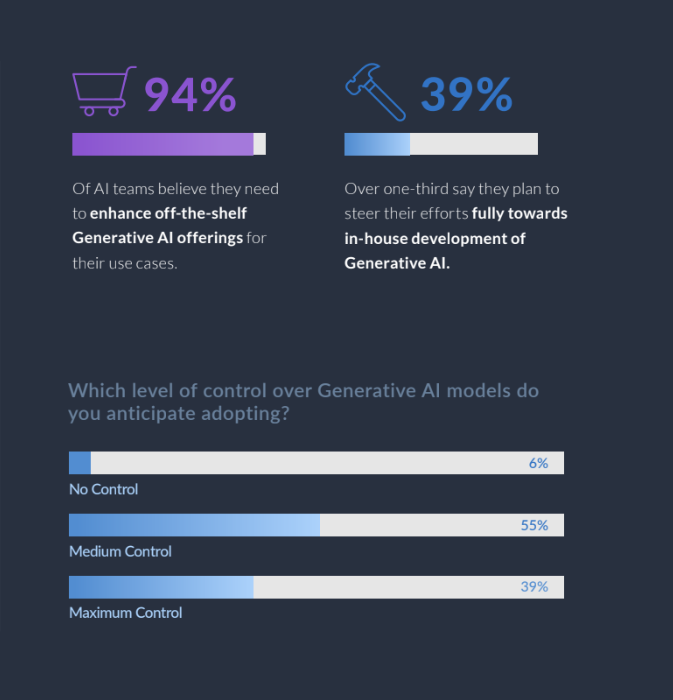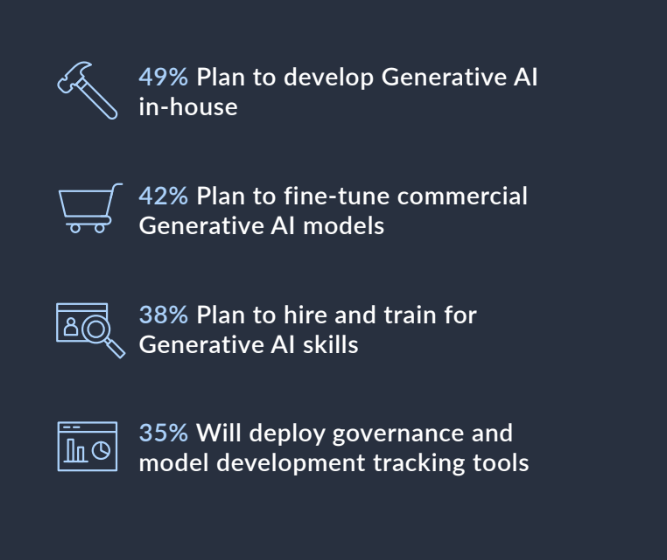What The Experts Expect of Generative AI: Domino's 2023 REVelate Survey
Kjell Carlsson2023-06-27 | 7 min read

Generative AI is moving swiftly from intriguing novelty to top priority for your digital transformation strategy. It is hijacking conversations everywhere, from the boardroom to the dining room. But what do the top data science leaders and practitioners from the world’s most advanced AI companies really think? How transformative do they believe Generative AI really is? What problems and risks do they see, and how are they going about turning Generative AI into tangible business value? We surveyed them to find out.
Domino Data Lab’s second REVelate survey of AI professionals — those leading, developing and operating AI initiatives across Fortune 500 companies— reveals new insights from those tasked with generating transformative AI outcomes about the potential, challenges and best practices for Generative AI.
Generative AI: It’s Real, It’s Around the Corner, and it is Even More Impactful than People Realize
As a rule, data science leaders are a skeptical bunch – some remember the “AI winters” in decades past, and most have seen the adoption of deep learning technologies take far longer than expected. Not so when it comes to Generative AI. Nine out of ten (90%) survey respondents believe that the hype surrounding Generative AI is beyond justified. More than half (55%) of data science leaders believe it will have a significant impact on their business within the next 1-2 years. Indeed, 45% of respondents believe that Generative AI will have an even greater impact than the already stratospheric expectations around the technology today.

To Transform with Generative AI Go Beyond Generic AI
Companies hoping that they won’t have to invest in Generative AI and that they can just piggyback on the AI features planned by ISVs and other third parties are in for a rude awakening according to the survey participants. A mere 6% view this as a viable strategy while the remainder (94%) believe their organizations must create their own Generative AI offerings. Most (55%) plan to create differentiated customer experiences on top of the foundation models offered by third parties, but a full 39% go further and believe their organizations must develop their own proprietary Generative AI models.

The Challenges and Risks are Just as Real, Especially with Current Generative AI Offerings
The great expectations surrounding Generative AI are tempered by significant hurdles. Most see challenges surrounding governance (57%), mitigating bias and ensuring fairness (51%), as well as issues of control (49%), as being just as or more important, than having the skills for developing Generative AI solutions (49%). Respondents also flagged serious issues with the commercially available Generative AI offerings available today – such as ChatGPT and other generative models offered as a service – as problems that are preventing increased use of Generative AI. Top concerns here were the security (54%), reliability (44%) and IP protection (42%) provided by these offerings.
Senior leadership is especially worried with around three-quarters of C-level/VP data science executives expressing concern about governing Generative AI solutions (76%) generally, as well as the reliability (76%) and security (71%) of current Generative AI offerings.
The biggest risk that survey participants were worried about is data leakage (69%), with both top leadership (82%) and IT (81%) being especially concerned. However, nearly a third of respondents also noted major risks of Generative AI having low accuracy or leading to bad business decisions (35%) and cost overruns (33%) due to the high cost of operating and maintaining large language models.
The Solution: Build Generative AI Capabilities
To tackle the challenges, mitigate the risks, and unlock the business impact of implementing Generative AI solutions, respondents pointed to a range of strategies for building their own Generative AI capabilities. The most frequently reported strategies involved implementing tools for the development, fine-tuning, and governance of Generative AI models.

Nearly twice as many respondents were planning to implement tools and platforms for developing and deploying Generative AI models in-house (49%) versus leveraging 3rd party Generative AI models as a service (26%).
Additionally, respondents were planning to invest in tools to make it easier to fine-tune Generative AI models (41%) and implement governance capabilities (35%) for tracking and managing the development of Generative AI models.
Conclusion: Generate Your Generative AI Transformation
The 2023 REVelate survey provides a unique glimpse into the leaders and practitioners who are both AI experts and tasked with driving business impact with AI. As such, the survey is one of the best views to date of the expected impact and challenges, as well as the approaches, for generating real-world outcomes with Generative AI.
The findings validate the incredible business potential of Generative AI and its expected near-term impact. However, it also confirms key challenges —governance, control, privacy, and fairness— as well as the severe limitations of the current, commercially available Generative AI offerings. Survey participants overwhelmingly believe that organizations must build their own Generative AI capabilities and develop their own, differentiated Generative AI solutions in order to unlock the potential of Generative AI, circumvent its challenges, and mitigate its risks.
Numerous Domino Data Lab customers have already turned Generative AI from a buzzword into reality with Generative AI models in production across industries ranging from life sciences to insurance. They are leveraging the scalability, extensibility, and governance capabilities of the platform to out-innovate and outperform with Generative AI – rapidly, responsibly and cost-effectively. If you're keen to develop your Generative AI capabilities, read the full survey results and contact us. Generative AI is the future, and we can help you define it.
Methodology
In June 2023, Domino Data Lab surveyed the attendees at Rev 4, the largest enterprise AI and MLOps conference. The survey examined the impact, adoption plans, limitations, risks, and related mitigation strategies that AI professionals see, or expect to see, as they adopt or develop Generative AI technologies across their employer’s organization.
The 162 respondents self-identified as one of the following: Data Science Executive (C-level/VP), Data Science Leader, Data Science Practitioner, IT Platform Owner. Due to sample size, findings specific to respondents in one of these roles are directional. Additionally, some subjective observations are based on interviews with Domino customers.
Kjell Carlsson is the head of AI strategy at Domino Data Lab where he advises organizations on scaling impact with AI technologies. Previously, he covered AI, ML, and data science as a Principal Analyst at Forrester Research. He has written dozens of reports on AI topics ranging from computer vision, MLOps, AutoML, and conversation intelligence to augmented intelligence, next-generation AI technologies, and data science best practices. He has spoken in countless keynotes, panels, and webinars, and is frequently quoted in the media. Dr. Carlsson is also the host of the Data Science Leaders podcast and received his Ph.D. from Harvard University.
Summary
- Generative AI: It’s Real, It’s Around the Corner, and it is Even More Impactful than People Realize
- To Transform with Generative AI Go Beyond Generic AI
- The Challenges and Risks are Just as Real, Especially with Current Generative AI Offerings
- The Solution: Build Generative AI Capabilities
- Conclusion: Generate Your Generative AI Transformation
- Methodology



